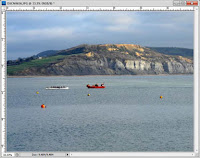Excercise:
Choose
one image which is available in JPEG and RAW which needs some adjustments. Then
use your processing software to adjust both images to a satisfactory state.
JPEG
·
Set
the black point and white point· Assess and adjust the brightness of mid tones
· Assess and if necessary adjust the contrast
· If necessary make corrections to localised areas.
RAW
· Set the black and white points using Exposure
· Assess and if necessary adjust the brightness of the midtones
· Assess and if necessary adjust the contrast
· If necessary make corrections in localised areas
---------------------------------------------------------------------------------
JPEG
Original JPEG Image
 |
| Original Image |
Here’s my original image above taken in January 2012. The whole image is very low key apart from the two boats in the middle section.
JPEG
Procedures
Firstly,
I opened Levels and you can see the original settings below.I set the sliders to be nearly touching the main parts of the histogram
 |
| Black and white sliders adjusted |
Now
I changed the midtones using the Levels again; you have to be careful not to
overdo it as the image can look unnatural.
 |
| Mid tones adjusted |
 |
| Mid tones adjusted |
Compare the two images
The original
image is pale and has a bluish haze; the final adjusted image has a much more
interesting colour and definition.
 |
| Original image |
 |
| Levels adjusted image |
RAW
Original RAW Image
The original image in RAW which
you can see below through the RAW Plugin converter in Photoshop CS5:
If
I change the setting from default to Auto Adjust you can see quite a dramatic
change to the image:
· Recovery from 0 to +1
· Blacks from 5 to 70
· Brightness from +50 to 0
· Contrast from +25 to +50
If I
change the settings manually one at a time you see the following changes:
· Adjust the black point and the white point by adjusting Exposure:
The red warning areas have come on to indicate that
there was very little detail on the side of the white rowing boat and the
yellow buoys. I moved the scale to +70 on the Recovery slider and this retrieved
enough information to eliminate the red, blown areas, see above.
I
adjusted the Exposure to correct the mid-tones and found that by taking the
reading up to -1.00 it made the whole image darker but this was corrected in
Contrast when I changed the reading to +86.
· Assess and if necessary adjust the contrast. Experiment with Tone Curve:
I
changed the Highlights, using Tone Curve, to -43 but had to decide how much to
reduce as, when I took it too far to the left, some of the figures took on
a blue hue when they should have been black.
I made the Lights +46 as this lifted the image and although it looks
dark in the screen shot above, it is considerably lighter when saved as a TIFF
or JPEG file.
I
changed the Darks to -12 and I altered the Shadows only slightly to -15 as too
much darkened the picture too much.
I
saved it as a TIFF file in case I wanted to make any further corrections using
Levels or Shadows/Highlights, but this is the final image from the RAW file.
 |
| JPEG final image |
 |
| RAW converted final image |
Whilst
the RAW image is still slightly darker than I would like I managed to retrieve
much more detail using the RAW converter software than by using Levels and
Shadows/Highlights for the JPEG image. i can adjust the darker image using Levels.








No comments:
Post a Comment